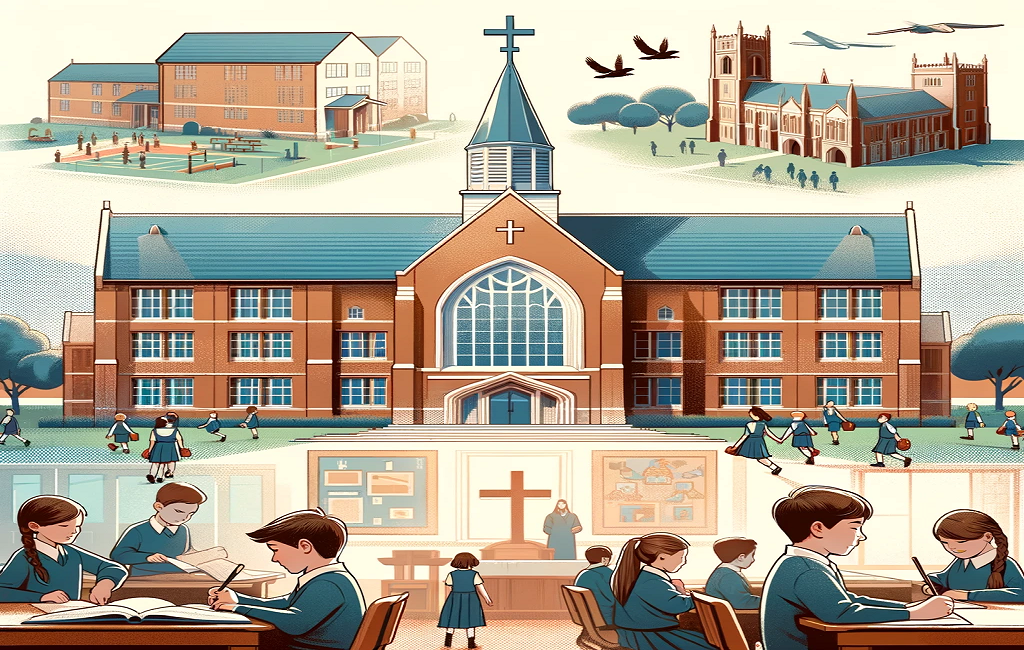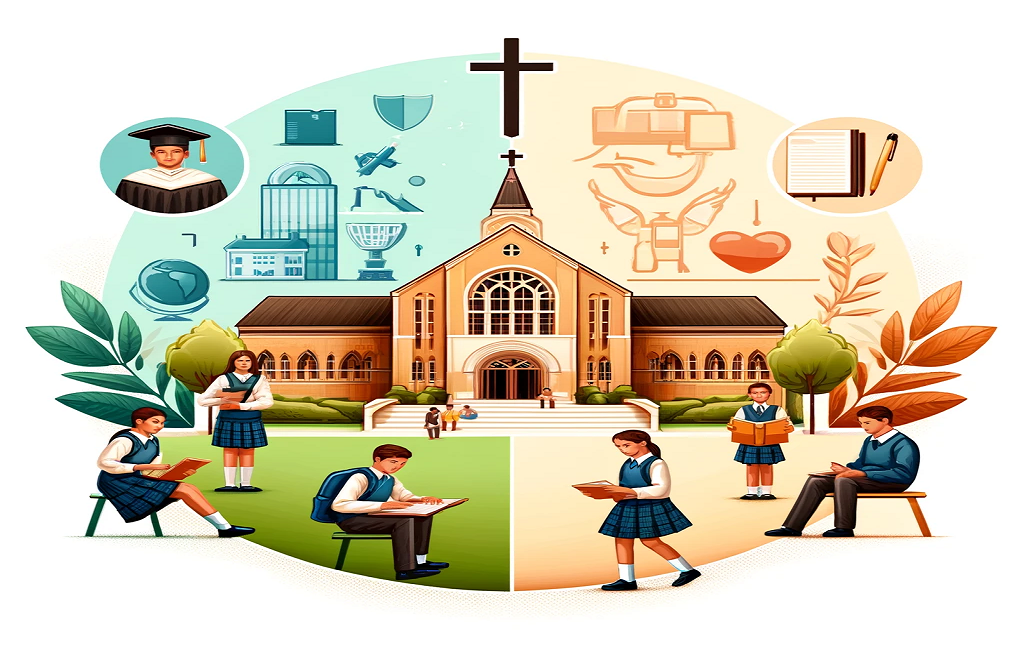
Catholic schools have a long-standing tradition of providing quality education with moral and ethical teachings. These institutions are often seen as bastions of academic excellence and character development, offering a unique blend of rigorous academic standards and a strong emphasis on values and faith. However, like any educational system, Catholic schools come with their own set of challenges and considerations.
In this comprehensive guide, we will delve into Catholic schools‘ various pros and cons, offering a balanced perspective for individuals interested in moral and ethical development. We will explore the historical context, the benefits and drawbacks, and provide practical advice to help you decide whether a Catholic school is the right choice for your educational needs. By the end of this article, you will have a clear understanding of what Catholic schools offer and their potential challenges, allowing you to make a well-rounded decision based on your values and priorities.

Table of Contents
History and Purpose of Catholic Schools
Catholic schools have a rich history that dates back to the early days of Christianity. Their primary purpose has always been to provide an education firmly rooted in the teachings and traditions of the Catholic Church. Over the centuries, Catholic schools have evolved and expanded, adapting to society’s changing needs while remaining true to their foundational principles.
Early Beginnings
The origins of Catholic education can be traced back to the monastic schools of the early Middle Ages. Monasteries were learning centres where monks preserved and copied essential texts, and young men were educated in various subjects, including theology, philosophy, and the liberal arts. These early schools laid the groundwork for developing more formal Catholic educational institutions.
Expansion and Growth
The establishment of the first universities in Europe during the 12th and 13th centuries marked a significant milestone in the history of Catholic education. Many early universities, such as the University of Paris and the University of Bologna, were founded by the Church and played a crucial role in advancing knowledge and learning. The Catholic Church’s commitment to education continued to grow, and by the 16th century, numerous religious orders, such as the Jesuits, began to establish schools and colleges across Europe and beyond.
Catholic Schools in the Modern Era
In the 19th and 20th centuries, Catholic schools experienced significant growth, particularly in the United States and other countries with large Catholic populations. Immigrant communities often established their schools to preserve their cultural and religious heritage while providing a quality education for their children. These schools became vital centres of learning and community for many Catholic families.
Purpose and Mission
The primary purpose of Catholic schools is to provide an education that integrates faith, culture, and life. This holistic approach to education aims to develop students intellectually, spiritually, morally, and socially. Catholic schools strive to create environments where students can excel academically while growing in their faith and developing a robust moral compass.
Critical aspects of the mission of Catholic schools include:
- Faith Formation: Providing religious education and opportunities for spiritual growth, helping students to develop a personal relationship with God and a deep understanding of Catholic teachings.
- Academic Excellence: Maintaining high academic standards and fostering a love of learning, critical thinking, and intellectual curiosity.
- Character Development: Emphasizing the importance of virtues such as compassion, integrity, and respect and encouraging students to live out these values daily.
- Community and Service: Building a solid sense of community within the school and encouraging students to be active and responsible members of society through service and outreach programs.
Catholic schools play a vital role in the educational landscape, offering a unique blend of academic rigour and faith-based learning. As we explore the pros and cons of Catholic schools, it is essential to understand this historical context and the enduring mission that drives these institutions.
Pros of Catholic Schools
Catholic schools are known for their distinct advantages, which stem from theirEmphasiss on academic excellence, mEmphasis ethical development, and strong community values. Here are some of the key benefits of attending a Catholic school:
Academic Excellence
Catholic schools are widely recognized for their highly recognized and rigorous curricula. Students in Catholic schools often perform better academically than their peers in public schools. This success can be attributed to several factors:
- Small Class Sizes: With smaller student-to-teacher ratios, Catholic schools can provide more personalized attention and personalized achieve their full potential.
- Qualified Teachers: Teachers in Catholic schools are typically well-qualified and dedicated to fostering a love of learning in their students.
- Structured Environment: Catholic schools’ structured and disciplined environment helps create a focused atmosphere conducive to academic achievement.
Moral and Ethical Development
One of the primary goals of Catholic education is to instil strong moral and ethical values in students. This focus on character development is integrated into every aspect of the school experience:
- Values-Based Education: Catholic schools emphasize conformity and reemphasize it. These values are taught through religious education classes and reinforced in daily interactions and school activities.
- Service Learning: Students are encouraged to participate in community service projects, which help them develop a sense of social responsibility and a commitment to helping others.
- Role Models: Teachers and staff in Catholic schools often serve as positive role models, demonstrating ethical behaviour and providing guidance on moral issues.
Safe and Nurturing Environment
Catholic schools are known for their safe and nurturing environments, which are critical for effective learning and personal growth:
- Strong discipline policies emphasize discipline, emphasizing where students can focus on their studies without fear of bullying or violence.
- Supportive Community: The close-knit community in Catholic schools provides a support network for students, helping them feel valued and understood.
- Holistic Approach: Catholic schools take a holistic approach to education, addressing the intellectual, emotional, and spiritual needs of students.
Strong Community and Parental Involvement
The sense of community in Catholic schools is one of their standout features:
- Active Parental Involvement: Parents are often highly involved in school activities, which helps strengthen the school community and provides additional support for students.
- Collaborative Atmosphere: The collaboration between teachers, parents, and students creates a positive and supportive educational environment.
- Shared Values: The school community’s standard values and beliefs foster unity and belonging.
Emphasis on Discipline and Respect
Discipline and respect are core principles in Catholic education:
- Structured Environment: The structured environment helps students develop self-discipline and a sense of responsibility.
- Respect for Others: Students are taught to respect their peers, teachers, and themselves, which promotes a positive school culture.
- Life Skills: The emphasis is on discipline and respect. Students develop valuable life skills beyond the classroom.
Comprehensive Religious Education
Religious education is a cornerstone of Catholic schools, offering students a deep understanding of their faith:
- Faith Integration: Religious teachings are integrated into the daily curriculum, helping students see the connection between their faith and everyday lives.
- Spiritual Growth: Opportunities for prayer, worship, and reflection are provided, allowing students to grow spiritually and develop a personal relationship with God.
- Moral Framework: The religious education curriculum provides a moral framework that guides students in making ethical decisions.
In summary, Catholic schools offer a unique blend of academic excellence, moral and ethical development, a safe and nurturing environment, strong community involvement, an emphasis on discipline and respect, and comprehensive religious education. These advantages make Catholic schools appealing to many families seeking a well-rounded education for their children.

Cons of Catholic Schools
While Catholic schools offer many benefits, they also have certain drawbacks that parents and students should consider. Here are some of the critical disadvantages of attending a Catholic school:
Financial Costs
One of the most significant drawbacks of Catholic schools is the financial burden they can impose on families:
- Tuition Fees: Catholic schools charge tuition fees, which can be substantial. These costs can be a significant barrier for families with multiple children or limited financial resources.
- Additional Expenses: In addition to tuition, there are often additional costs for uniforms, books, extracurricular activities, and school trips. These expenses can add up quickly, making Catholic education even more costly.
- Limited Financial Aid: While some Catholic schools offer scholarships and financial aid, these resources are often limited and may not cover all expenses. This can make it challenging for families to afford a Catholic education.
Limited Curriculum Options
Catholic schools may offer fewer curriculum options compared to public schools:
- Elective Choices: The focus on religious education can lead to a more limited selection of elective courses. Students may have fewer opportunities to explore diverse interests and subjects.
- Advanced Programs: Some Catholic schools may not offer as many advanced placement (AP) or honours courses as public schools, which can impact students’ academic opportunities and college preparation.
- Extracurricular Activities: While many Catholic schools offer a variety of extracurricular activities, the range may be narrower than that of larger public schools. This can limit students’ opportunities to engage in sports, arts, and other interests.
Strict Adherence to Religious Doctrine
The strong emphasis on Catholic doctrine in tEmphasisools can be both a benefit and a drawback:
- Religious Curriculum: The curriculum includes mandatory religious education classes and participation in spiritual activities. This can be a point of contention for families who do not share the Catholic faith or those with different religious beliefs.
- Limited Exposure to Diverse Perspectives: Strictly adherence to Catholic teachings can limit students’ exposure to diverse viewpoints and ideas. This may result in a less well-rounded education regarding cultural and ideological diversity.
- Potential for Conflict: Families with differing beliefs or prioritized education may find Catholic schools’ religious aspects restrictive or contrary to their values.
Potential Lack of Diversity
Catholic schools may have less diversity in their student population compared to public schools:
- Cultural Homogeneity: The student body in Catholic schools is often more culturally and religiously homogenous, which can limit students’ exposure to different backgrounds and perspectives.
- Socioeconomic Diversity: The financial costs associated with Catholic education can also result in less socioeconomic diversity, as families from lower-income backgrounds may be unable to afford tuition and fees.
- Limited Inclusivity: Some Catholic schools may have policies or practices that are less inclusive of students from non-Catholic or marginalizemarginalizeds, potentially leading to feelings of exclusion or isolation.
LessEmphasiss on omarginalizedcular ActEmphasis
While academic and religious education is prioritprioritizeditprioritizeds may place less emphasis on extracurricular activities.
- Limited Resourcprioritizedc schools often have fewer resources than public schools, which can result in a narrower range of extracurricular options and facilities.
- Focus on Academics and Religion: The primary focus on academics and religious education can sometimes overshadow the importance of extracurricular activities, which are crucial for students’ overall development.
- Balancing Priorities: Students in Catholic schools may find it challenging to balance the demands of rigorous academics, religious obligations, and participation in extracurricular activities.
In summary, while Catholic schools provide numerous advantages, they also present challenges, including financial costs, limited curriculum options, strict adherence to religious doctrine, potential lack of diversity, and less emphasis on extracurricular activiEmphasismilies should carefully consider these factors when deciding if a Catholic school is the right fit for their child’s educational needs.
Personal Opinion and Insights
In my experience, Catholic schools offer a unique and enriching educational environment that fosters academic and personal growth. Integrating faith-based teachings with a rigorous academic curriculum provides students with a holistic education beyond mere knowledge acquisition. Here are some of my insights into the advantages and challenges of Catholic schools:
Balancing Faith and Education
One of the standout features of Catholic schools is their ability to balance faith and education. The religious component of the curriculum encourages students to develop a solid moral and ethical foundation, which is invaluable in today’s world. By learning about values such as compassion, integrity, and respect, students are better equipped to navigate the complexities of life with a clear sense of right and wrong. This focus on moral development sets Catholic schools apart and significantly benefits students.
The Sense of Community
Catholic schools often foster a strong sense of community among students, parents, and staff. This close-knit environment creates a supportive network that enhances the educational experience. Parents’ active involvement and emphasis on communal activities emphasize relationships and a sense of emphasis. This communal support can be particularly beneficial for students, providing them with a stable and nurturing environment that promotes academic and personal success.
Academic Excellence and Discipline
The commitment to academic excellence in Catholic schools cannot be overstated. The structured and disciplined approach to education helps create an environment where students can thrive academically. Smaller class sizes and personalized teachers contribute to personalized academic achievement and better preparation for future careers. The emphasis on discipline also instills responsibility and self-control in students, essential skills for success in any field.
Financial and Curriculum Limitations
However, it is essential to acknowledge the challenges of Catholic education. The financial cost of tuition and additional expenses can be a significant barrier for many families. This economic burden can limit access to the benefits of Catholic education, making it less inclusive than public schooling options. The limited curriculum options and strict adherence to religious doctrine can also restrict students’ exposure to a broader range of subjects and perspectives. This can be a drawback for students with diverse interests or seeking a more secular education.
Navigating Religious Differences
For families who do not share the Catholic faith, the religious aspect of Catholic schools can be both a point of interest and a potential challenge. While moral teachings and values can be universally beneficial, mandatory religious education and activities might not align with the beliefs of all families. This can lead to conflicts or feelings of exclusion, particularly for students from non-Catholic backgrounds.
Conclusion
In conclusion, Catholic schools offer a distinctive educational experience combining academic rigour and moral development. The benefits of a strong sense of community, high academic standards, and a focus on values are significant. However, the financial costs, limited curriculum options, and strict religious adherence are essential considerations. Families should consider these factors to determine if a Catholic school aligns with their educational goals and values. By understanding the pros and cons, parents can make informed decisions that best support their child’s development and future success.

FAQs
What does it mean to be in a Catholic school?
Attending a Catholic school means receiving an education integrating Catholic religious teachings with academic learning. Students participate in religious activities, such as Mass, prayers, and spiritual education classes, and are encouraged to develop a personal relationship with God. The curriculum is designed to foster intellectual growth and moral and ethical development, helping students live according to Catholic values and principles.
Is evolution taught in Catholic schools?
Evolution is typically taught in Catholic schools as part of the science curriculum. The Catholic Church accepts the theory of evolution as a valid scientific explanation for the development of life on Earth, provided it does not contradict the belief in divine creation. Students learn about evolution alongside religious teachings, emphasizing how scientific and emphasizing perspectives coexist.
Why do I love the emphasis emphasizing essays?
An emphasis on your Catholic school might highlight several vital aspects, such as a sense of community, moral and ethical development, high academic standards, and a nurturing environment. Personal anecdotes about positive experiences, such as participation in community service projects, meaningful religious activities, or supportive relationships with teachers and peers, would add depth and authenticity to the essay.
Why is religion important in Catholic schools?
Religion is important in Catholic schools because it provides a foundation for the school’s values, teachings, and community life. It helps students develop a moral compass, understand their faith, and integrate religious principles into their daily lives. Religious education fosters spiritual growth, encouraging students to create a personal relationship with God and live out their faith through acts of service and compassion. The integration of faith and education aims to produce well-rounded individuals who are not only academically proficient but also morally and ethically grounded.
Conclusion
Catholic schools offer a distinctive educational experience that combines academic excellence with a strong emphasis on moral and ethical development. These institutions are designed to provide students with a holistic education that nurtures their intellectual, spiritual, and social growth. The many benefits of Catholic schools include high academic standards, a safe and nurturing environment, a strong sense of community, and a focus on discipline and respect. Additionally, the comprehensive religious education provided in Catholic schools helps students develop a deep understanding of their faith and moral values.
However, several challenges are also associated with Catholic education. The financial costs can be prohibitive for some families, and the limited curriculum options may not meet the needs of all students. The strict adherence to religious doctrine might be a point of contention for families with different beliefs, and the potential lack of diversity can limit students’ exposure to a broader range of perspectives and experiences. Additionally, the emphasis on academics and religion might result in fewer extracurricular opportunities than in public schools.
Ultimately, deciding to enrol a child in a Catholic school should be based on carefully considering these pros and cons. Families must weigh the benefits of a values-based education against the potential challenges and determine if the overall environment aligns with their educational goals and values. By understanding the unique aspects of Catholic schools, parents can make informed decisions that support their child’s overall development and future success.
Catholic schools play a vital role in the educational landscape, offering a unique blend of faith, learning, and community. For many families, the advantages of a Catholic education far outweigh the drawbacks, providing a foundation for lifelong learning and moral integrity. By fostering academic and personal growth, Catholic schools strive to develop well-rounded individuals prepared to make positive contributions to society.


I am impressed with this website , very I am a big fan .